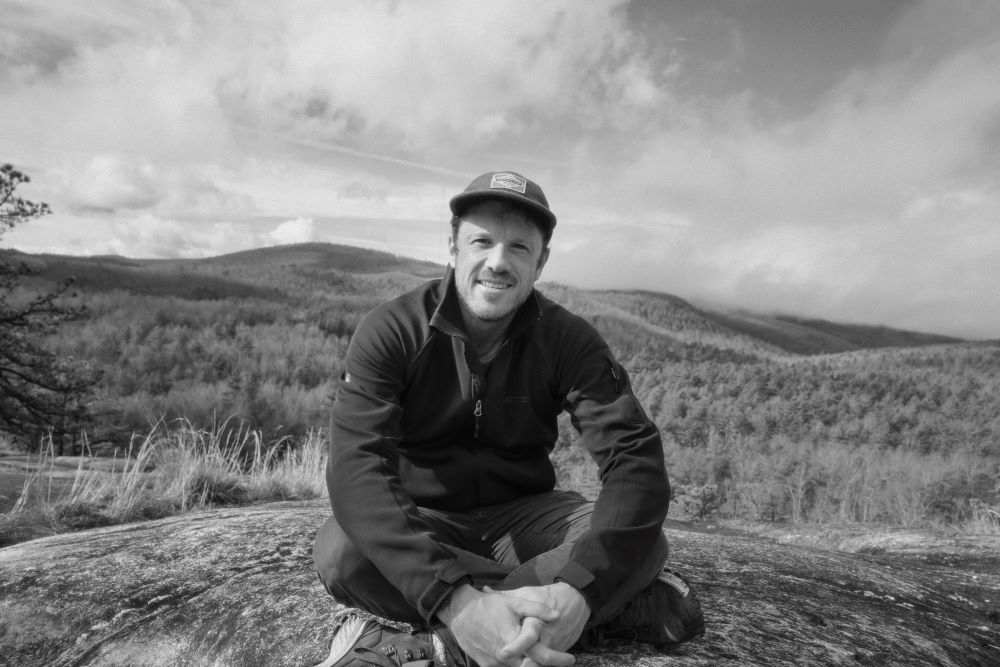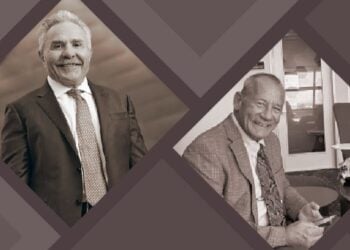Rick Sichta didn’t set out to become an attorney because of some courtroom drama or a deep fascination with the U.S. Constitution. His path began in a far more unlikely place: the boy’s bathroom of his small rural Wisconsin high school.
It was the early 1990s, and Sichta had finished rehearsing with his heavy metal band. He was still buzzing from playing Black Sabbath and Ozzy Osbourne covers with his friends when the school principal confronted him.
“Are you doing drugs? Are you getting into trouble?” the man demanded.
Sichta was floored. He was on the baseball team, had been chosen as one of the team’s best players (he would later go on to play college baseball as pitcher, go undefeated throughout his career, and graduate with honors), was getting passing grades, not getting into trouble, and guilty only of wearing his hair long and his love for a certain type of music. Yet in that moment, he realized how easily people judged others not for their actions, but solely based on how they appear, what music they listened to, or the assumptions society had already made about them.
“That moment really stuck with me,” he recalls. “It made me wonder how many people out there are innocent but still being judged negatively or even harshly just because they’re different from what others consider normal.”
By the time his yearbook photo rolled around, Sichta had made up his mind. He knew his mom had always wanted to become a lawyer but chose to stay home to raise him and his younger brother, and his mom was his idol. Now he had cause. In the small space reserved for ambitions and afterthoughts of the high school graduates, he wrote: Become a lawyer. He would be the first in his family to do so.
It was less an aspiration than a declaration. And over the next three decades, Sichta would not only become a lawyer, but one of Florida’s most respected appellate attorneys, dedicated to defending the criminally accused, and maybe, some that had a story similar to his.
The Psychology of Justice
Sichta’s fascination with justice has always gone hand in hand with his love of psychology. In college, he excelled at statistics and minored in psychology, immersing himself in the study of human behavior and the forces that shape it.
“I wanted to know why people turn out the way they do,” he says. “Why someone makes certain choices. How environment, trauma and mental health intersect with crime.”
That curiosity drew him into some of the most intense corners of criminal law, working with clients on death row, many of whom were the most mentally unstable members of society. He speaks of them not with fear or disdain but with a scientist’s curiosity and a humanitarian’s compassion.
“In college, I studied sociology and criminology to figure out the different heories from all the experts such as why we do certain things in groups or individuals,” says Sichta. “Also looking at things like the ‘labeling theory’ how people begin a life of crime because they’ve always been labeled as someone who would participate in criminal activity. I find all that fascinating and still read a lot of psychology books.
“Pure, objective science is what interested me,” he explains. “Not to excuse behavior, but to understand it. Because when we understand, we can pursue true justice instead of stereotypes.”
Because of this interest, Sichta adds, “there have been times when I thought I’d like to be on the prosecution side as well,” he adds with a gleam in his eye.
Baptism by Fire
If curiosity drew him to criminal law, determination carried him through the early years.
“I wanted to be good right away,” he admits. “And I knew that meant putting in the hours.”
When he wasn’t working, Sichta studied. He spent nights watching YouTube cross-examinations, days attending trials just to observe skilled attorneys in action, and weekends poring over case law.
That hunger paid off quickly. Still in his twenties, Sichta was thrust into high-profile, high-stakes cases—including death penalty defenses where the media ran public polls asking whether his client deserved execution.
One turning point came during a capital case in which he successfully convinced a jury to recommend life instead of death. A veteran and well-known attorney, who had been the star of an award-winning movie Murder on a Sunday Morning, had consistently shunned Sichta’s advancements at conversation (Sichta jokes), suddenly was calling Sichta and asking him legal questions about the case.
“It was then I knew I was doing something right,” Sichta says with a quiet smile.
The Cost of Compassion
But criminal defense is not for the faint of heart. The clients’ mental disabilities create a volatile environment. The stakes are literally life or death. And the toll on an attorney’s emotional well-being can be profound.
“Let’s put it this way, I would not encourage any of my daughters to embark on this career,” he says. “Certainly, it can be very gratifying, very rewarding, but it takes a toll professionally, psychologically and personally.”
Sichta recalls one chilling incident when a client accused of setting off a bomb in a house, left a package on the back steps of the law office he was working at. The fear was real—not just for himself, but for his family.
“When you’re taking cases like that, you can’t just gear up cerebrally; you have to prepare emotionally,” he explains. “You’re dealing with people who are angry, traumatized, and often cognitively disturbed.”
For years, he tried to manage the pressure with exercise, music and writing. But eventually, he and his wife and legal partner, Susanne, realized they had to become selective in the cases they took. Launching their own firm, The Sichta Firm was a first step.
“It wasn’t about walking away from hard work,” Sichta says. “It was about protecting our personal lives, our marriage, and our sanity. We focus on our clients using the lens provided by the Constitution – justice, due process and fundamental respect and fairness for all the parties involved.”
That balance keeps him going.
“Not only did we want the autonomy of selecting which cases to undertake, but we also needed more flexibility, especially once we started our family,” Rick says. “We try to keep work and personal life separate, but when we’re in the middle of a case, the ideas just keep coming—we’ll usually be talking about it all the time. At least we try to keep that shop talk away from the kids. Susanne and I also have an interesting method: I’ll take one aspect of the case, she takes the other, and then we fact-check and review everything together. From the very beginning, we’ve told every client that’s what they’re getting—two attorneys, both fully invested and passionate about their case.”
That flexibility, they discovered, comes with long hours and the tendency to lose track of time when absorbed in their work. Still, well before the pandemic normalized remote practice, the couple had already mastered it—and today, they are especially grateful for how technology allows them to balance professional demands while raising their three daughters in the quiet, close-knit mountain community they now call home in North Carolina.
A Philosophy of Respect
If there’s a “secret sauce” to Sichta’s success, it’s not just intelligence—though he has that in spades. It’s respect.
He refuses to let clients call him “sir” or “Mr. Sichta.”
“So many of my clients don’t trust their defense attorneys,” he explains. “They’ve been failed, abused and mistreated their whole lives. Although they may be charged with some awful crimes, I can still treat them with dignity. Sometimes that is all you need to see a positive change in a client’s overall demeanor and outlook on life. “I want to find the positive characteristics in my clients and empower them to understand they are better than their worst days.”
Sichta believes this empowers people, because “if you are a caring, empathetic individual, you are unlikely to want to make someone or someone’s family a victim.”
That approach has earned him not only the gratitude of clients but the respect of colleagues and the admiration of judges. To Sichta, it’s not about winning at all costs, it’s about ensuring the Constitution has a fair chance to operate the way it was intended for all parties involved.
Beyond the Courtroom
For all the seriousness of his work, Sichta remains, at heart, a creative. Although he has replaced heavy metal with folk music, music still plays a central role in his life, both as an outlet and a source of balance.
“When I was younger, music gave me identity,” he says. “Now it helps me process everything: stress, anger, grief. It’s my way of staying sane.”
Today, music has also gained him a wide and appreciative audience as he prepares to launch his third album. One of his personal favorites clearly demonstrates where his heart is. It’s a folk album entitled, “Ten Songs for My Girls, Now and Later” – all songs he wrote for his daughter’s bedtime routine that they convinced him to turn into an album.
That creative streak runs parallel to his work as a philosopher, psychologist, and, in his own effort to eliminate bias and stereotypes in the courtroom. He and Susanne have built a legal practice that doesn’t just argue cases but challenges a segment of society’s gravitation to stereotype, label, and dismiss.
Full Circle
In many ways, Sichta’s entire career has been an answer to that bathroom confrontation decades ago.
Once dismissed as a long-haired heavy metal kid with assumed vices, he has built his life around defending others from the same kind of misjudgment. Where his principal saw a delinquent, the young Sichta saw an injustice. Where others saw “bad kids,” he saw people worthy of fairness and dignity.
Now, in Florida’s appellate courts, he fights to ensure those values aren’t just ideals but realities.
“I’ve always wanted everything to be objective and fair,” he says. “True justice, where all the factors of how we got to this point are evaluated objectively. That’s what keeps me going.”
It’s a mission born not in a classroom or a courthouse, but in a small-town school, where one teenager vowed to change the narrative—and has spent his life keeping that promise.
Sichta offered a parting reflection that encapsulates his philosophy: “I want to remain humble. Practicing law is a privilege, not a right.”









Comments 1
This man is my cousin. I’m a lawyer, too, a bit older. The sentiments he expresses on why he does what he does as a lawyer fully reflect mine. Maybe it’s the genes. Damn ,am I proud of him.